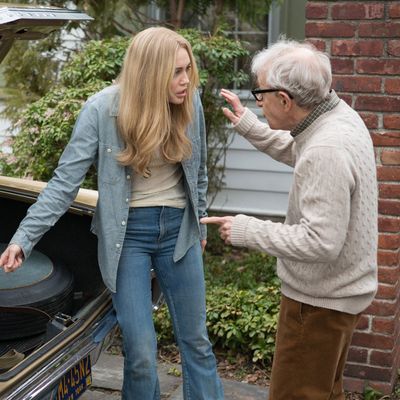
Woody Allen has infamously dismissed his own Amazon series A Crisis in Six Scenes, a semi-satirical tale of political strife in the late 1960s, as an afterthought, an obligation or something he did because somebody else told him that TV is where it’s at right now. The result, unsurprisingly, is a dubious monument to the filmmaker’s misgivings. It’s far from the worst thing that Allen has done recently but nowhere close to his finest work; it’s consistently better directed than acted and better acted than written, as is the case with much of his output post-2000. The most telling thing about it is its structure: There isn’t any to speak of. Allen seems to have paid no attention to the demands of serialized narrative; his version of a TV series is a feature-length motion picture meat-axed into 23-minute chunks.
And let’s not kid ourselves: Allen has never had much respect for television as a storytelling medium with its own unique properties, despite having started his career writing TV sketch comedy. He tacitly ‘fesses up to this disgust from frame one. The first scene in the first section of this movie/mini-series (I’m calling it that because it’s not really a series, and I’d be shocked if there were a season two) finds Allen’s character, advertising copywriter and frustrated J.D. Salinger–wannabe Sidney Muntzinger, telling his barber (Max Casella) that he’s working on a TV show. The barber correctly deduces that he’s just doing it for the money and seems quite aware that it represents a step down in prestige for Sidney (“a TV series is considered lowbrow compared to a book”). There’s also an acknowledgement that Sidney’s more respectable career has fallen on critical hard times, otherwise why would he do television? When Sidney describes his most recent, critically derided novel as “postmodern,” the barber chimes in, “It was totally incoherent … the ravings of a lunatic. I saw a lot of you in that character.” The note of aesthetic contempt gets things off to a sour start.
Once the story gets going, and we meet the young, slogan-spouting, violent revolutionary named Darlene “Lenny” Dale (Miley Cyrus), who moves in with Allen’s elderly bourgeois hero and his therapist wife Kay (Elaine May) after a jailbreak, things get sourer. This show is essentially Woody Allen’s Mad Men, except entirely tone-deaf about how people discussed the issues of the day at that moment in time. There’s nothing here to indicate historical or even intellectual curiosity about what that period in American history meant to young and old people living through it. The pilot begins with footage of the ‘60s Greatest Newsreel Hits (riots, war, etc.); from then on, we get lots of scenes of people arguing liberalism and conservatism, racism and feminism, class and generational conflict, in terms not too much more sophisticated than you’d encounter in one of those late-’60s “In Color!” episodes of Dragnet where Sgt. Joe Friday debates the ethics of political protest with hippies.
Unlike Mad Men creator Matthew Weiner, whose writing staff took great care in devising dialogue that seemed plausibly of its moment, even integrating casual references to then-current, often obscure popular culture and political figures referenced only by their surnames, Allen was actually alive and in his 30s when the great social upheavals of the ‘60s were happening, yet Crisis in Six Scenes feels as if it could’ve been written by a 2016 college graduate whose only sense of the ‘60s comes from half-watching Mad Men while folding laundry. “The fascist propaganda machine is in full swing,” Lenny exclaims during her first conversation with the Mutzingers, a seriocomic argument that occurs in the wee hours of the night. “Do all revolutionaries eat so much?” Sidney asks Kay, complaining that Lenny is raiding their fridge without permission. “Did Lenin eat so much?” “You plutocrats are lost without your high-end luxuries,” Lenny says, giving up purloined food, adding, “You sound like Nixon.” Then she chastises him for “selling people goods they don’t need or want with false claims.” The slow-burn joke here is that the Mutzingers will eventually and unwittingly become radicalized through their exposure to Lenny, the kind of yammering evangelical radical who hands out Communist literature and lectures the Mutzingers’ houseguest, Alan (John Magaro), who’s sweet on her. But there’s no weight to the couple’s transformation, comic or otherwise. It’s just a way of finally having something happen on a show that feels mostly inert.
The show, which was photographed by Eigil Byrd, looks great. The prototypically Allen-esque fall leaves that dominate the exteriors are matched by the yellow-brown interior of the lead couple’s palatial suburban home (Cheever country), and Allen’s directing is filled with his signature minimalist camera moves. Nobody blocks actors with more intelligence or evinces a better sense of how to move them through rooms, hallways, and doors to set up a joke or intensify a punch line. Like Clint Eastwood, Allen directs like an old prizefighter who doesn’t have the energy to dance around the ring anymore but knows how to wait for just the right opening and throw a jab that gets the job done. And throughout, there are amusing character bits happening on the sidelines, particularly in the glimpses of Kay’s therapy practice (Lewis Black and Becky Ann Baker shine as a disgruntled couple that can’t agree on anything except guacamole), and a book club that includes Joy Behar. But none of this craftsmanship adds up to much when the material is as quarter-baked as it is here.





